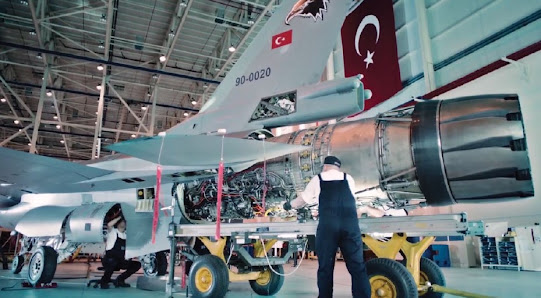Ad Code
Bitcoin
6/Bitcoin/post-list
Weekly
Aircraft
6/Aircraft/post-list
NFT
6/NFT/post-list
Turkish Aerospace Industries and Aselsan Agree on a US$2 Billion Contract to Upgrade 150 F-16 Block 30 Fighter Jets
Richards
2:52 AM
Table of Contents [Show]
Read Also:
After going through tug-of-war regarding approval from the United States Parliament, finally there has been a bright spot about the continuation of the operational future and development of the Turkish Air Force's F-16 Fighting Falcon fighter jet. Even though Turkey's defense industry has advanced, upgrading the F-16 still requires the blessing of US President Joe Biden.
The Turkish Air Force will upgrade 30-35 F-16 Block 30 units under the first phase of the project, followed by F-16 Block 40 and 50 in the next phase. As the backbone of air power, the Turkish Air Force currently operates 43 F-16 C/D Block 30 units, 117 Block 40 units, and 110 Block 50 units. With the large population of F-16s in the Ottoman Empire, the Turkish Air Force is very dependent on the US.
And recently, Turkish Aerospace Industries (TAI) and Aselsan signed a nearly US$2 billion deal to upgrade the F-16 jets. The deal announced by Aselsan, a specialist in military electronics, is worth $1.2 billion and 20.7 billion lira (US$789.2 million).
The Joe Biden administration has supported Turkey's wish to purchase 40 new F-16s (Vipers) as well as modernization kits from the US. Prior to that, Turkey's move to acquire new and upgraded F-16s was opposed by some in Congress, most notably Senate Foreign Relations Committee Chairman Bob Menendez, who opposed Turkey for blocking NATO membership for Sweden, its human rights record, and its relationship with Greece, and other issues.
Neither TAI nor Aselsan disclosed details of the contract, which was signed on July 13, 2023. Defense News said that the contract relates to a program to upgrade Turkey's aging F-16s, starting with the F-16 Block 30.
The upgrade program will include a new mission computer, installation of an active electronically scanned array (AESA) radar and a new avionics suite for some 150 of Turkey's F-16 aircraft. The F-16 upgrade on the Ozgur project includes updates to the electro-optical and avionics systems, the national mission computer, and operational flight software.
Additional updates also include identification Friend or Foe systems, inertial navigation systems, interface blinding units, helmet integrated aiming systems, center cockpit indicators and color multifunction displays – most of which will be supplied by the domestic industry.
An active electronically scanned array (AESA) radar produced by Aselsan will also be installed on the F-16s, along with several domestically developed missiles, such as the Gokdogan and Bozdogan air-to-air missiles, Gezgin and Cakir cruise missiles, and the Atmaca anti-ship missile.
The F-16 upgrade in the Ozgur project is expected to increase the aircraft's flight hours from 8,000 to 12,000 hours
As per the upgrade plan, the AESA radar will first be fitted to Akinci drones, then to a batch of 36 F-16 Block 30 aircraft; and, in the long term it will be installed on the Turkish-produced stealth fighter jet, TF-X (KAAN). Block 30 is the only F-16 model whose source code is available for Turkey.
This deal has two implications: First, it is part of Turkey's efforts to balance Greece's increased air superiority over the Aegean Sea, especially after Greece purchased the Rafale, and second, once the upgrade is successful and the aircraft is battle proven, it could pave the way for Aselsan and TAI to penetrate the world's large F-16 modernization market.
In 2019, Turkey requested a Link 16 tactical data link, among other technologies, for 199 F-16 jets. Then, according to a January 2023 media report, the Biden administration “informally notified Congress of its intention to sell 40 new F-16s in the Block 70/72 Viper (F-16V) configuration and Viper upgrade package for 79 existing fighters, along with 900 air-to-air missiles and 800 bombs, for an estimated total value of US$20 billion.
And in April, the US State Department publicly approved the sale of equipment and services to Turkey to support the European nation's upgrade of its F-16 fleet in a potential deal worth around US$259 million. The Congressional Research Service writes this possible sale appears to include Link 16.
Aselsan is the largest defense company in Turkey, and the 49th largest in the world by defense revenue, according to the Defense News Top 100 list.
Ratings:
Platform:
Monthly
Ethereum
6/Ethereum/post-list
Warships
6/Warships/post-list
Cryptocurrency
3/Cryptocurrency/post-list
Banking
3/Banking/post-list
Footer Menu Widget
Copyright ©
Escort Wide | Digital Media and Cryptocurrencies











0 Comments